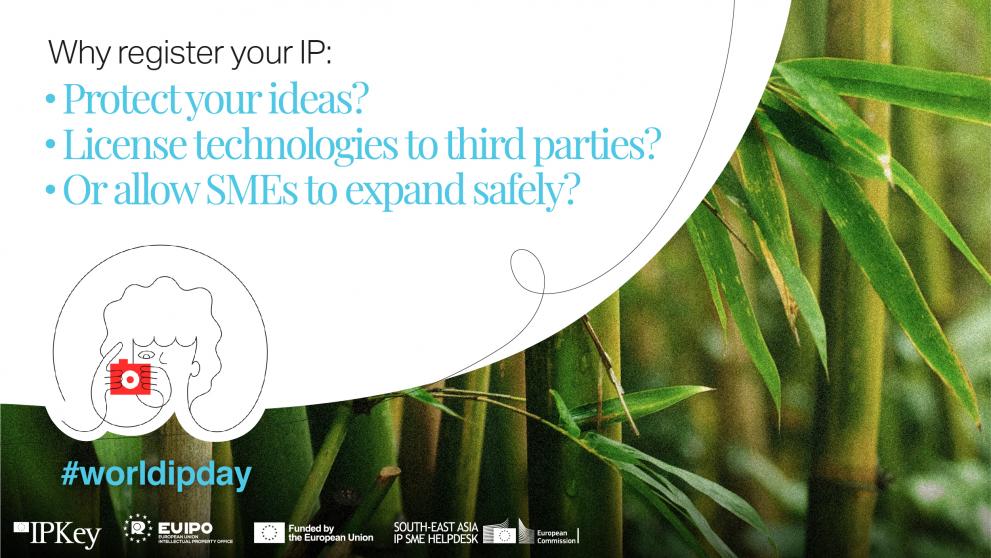
There are many benefits to living in an increasingly globalised and digitised world, such as greater connectivity, increased global trade and better information sharing. However, implicit in these benefits is a much greater potential for intellectual property rights (IPR) infringement. It is more important than ever that businesses, particularly small- and medium-sized enterprises (SMEs), proactively take the necessary actions to mitigate this risk.
The importance of SMEs in the global economy cannot be overstated. According to data from the World Bank, SMEs make up around 90% of the world’s businesses, employing approximately 50% of the global workforce and generating up to 40% of national income in many emerging economies ([1]). In an era dominated by global economic insecurity, exacerbated by the COVID-19 pandemic, it is vital that SMEs are made aware of the significant impact IPR ownership can have in terms of revenue, resilience and competitiveness. A 2021 study carried out jointly by the European Union Intellectual Property Office (EUIPO) and the European Patent Office (EPO) illustrates that SMEs that own IPRs have a 68 % higher revenue per employee than SMEs that do not ([2]).
For many SMEs, this is not the only financial incentive. Marc Peeters is the founding partner of Bambu Nusa Verde (BNV), a European financed SME based in Indonesia, exporting plants for bamboo end-products. Mr Peeters indicated that one of the reasons BNV was able to consolidate its position in the South-East Asian market is because the initial investment into the project was safeguarded by IPRs. As Mr Peeters explains, the company registered for IPRs ‘to protect against potential difficulties’ that would ultimately hinder the company’s growth and development, such as competitors making use of similar technologies.
The crux of the matter is that BNV, like many companies, is centred on a unique core idea and a one of a kind technology that can be monetised. Protecting this idea is therefore protecting the business itself. Mr Peeters added that BNV had a dual motive for protecting its innovative Bamboo BioTechnology (BBiT). Not only did registering IPRs make the company more resilient against competitors but it also created the potential to license the technology to third parties, laying the groundwork for future expansion. Indeed, Mr Peeters remarked that despite receiving many requests for access to the BBiT technology, ‘until today we have been reluctant to do so due to lack of registration’.
It is vital for SMEs to recognise that IPR ownership has benefits beyond solely preventing counterfeiting and infringement. Registering IPRs prevents both the potential and significant damages that can result from this activity. It also opens up vast commercial opportunities for the expansion of the company and licensing to external parties when done in the early stages of development.
Much of BNV’s recognition of the need to register IPRs derived from the truly distinctive nature of the idea they sought to protect. Financial benefits were naturally key, but so was protecting the energy and efforts dedicated to the research and development of BBiT, and this research is ongoing. Currently half of BNV’s employees work in research and development in order to continue refining and innovating the technology to keep pace with the company’s expansion and make the company’s important work more widely available. This would not be possible without IPR ownership protecting the ideas at the heart of the company.
Fortunately for BNV, the company’s largest shareholder, Jan Oprins, was aware early on of the need to register IPRs, having done so for a patent in the US. But, according to Mr Peeters, it was only upon meeting representatives from the South-East Asia IP SME Helpdesk project, an initiative of the European Commission, that ‘the ball started rolling’ on registering locally. IPRs are territorial in nature, and therefore only apply within the country where they are registered. BNV started the process immediately. It is important that SMEs take measures proactively.
In this regard, Mr Tiago Guerreiro, IP Key South-East Asia Project Leader added, ‘preventing IP infringement is much more effective than counteracting it, so SMEs benefit greatly from obtaining the relevant patents and designs prior to beginning to operate in the region’. Mr Benoît Tardy, IP Business Adviser of the South-East Asia IP SME Helpdesk agreed, ‘This is exactly the message the Helpdesk is trying to get across with our motto, #KNOWBEFOREYOUGO. For SMEs to be fully protected in SEA, it is critical that they register their IP rights before beginning operations there. Timing is crucial.’
As BNV looks to continue expanding locally as well as potentially licensing out BBiT to other companies and countries, solid registration practices are a key part of the vision. Reflecting on the company’s experience, Mr Peeters would very much recommend that SMEs who are just starting out protect their ideas and process. ‘Now I know the way,’ he says, ‘it is worth doing.’
And for any European SMEs who might be unfamiliar with both the processes and enforcement, it is worth noting that several tools, including IP Key South-East Asia, an international cooperation project implemented by the EUIPO, and the South-East Asia IP SME Helpdesk, exist to help European SMEs to protect their IP in SEA, free of charge.
([1]) https://www.worldbank.org/en/topic/smefinance.
([2]) https://euipo.europa.eu/ohimportal/en/web/observatory/ip-contribution.
Details
- Publication date
- 2 June 2021
